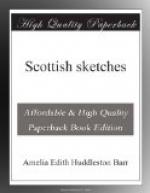“Fair nonsense! The height of nonsense! Your ancestors indeed! Mules make a great to-do about their ancestors having been horses!”
David retorted with hot sarcasm on the freebooting Leslies, and their kin the Armstrongs and Kennedys; and to Scotchmen this is the very sorest side of a quarrel. They can forgive a bitter word against themselves perhaps, but against their clan, or their dead, it is an unpardonable offence. And certainly Robert had an unfair advantage; he was in a cool, wicked temper of envy and covetousness. He could have struck himself for not having foreseen that old John Callendar would be sure to clear the name of dishonor, and thus let David and his L20,000 slip out of his control.
David had drunk enough to excite all the hereditary fight in his nature, and not enough to dull the anger and remorse he felt for having drunk anything at all. The dreary, damp atmosphere and the cold, sloppy turf of Glasgow Green might have brought them back to the ordinary cares and troubles of every-day life, but it did not. This grim oasis in the very centre of the hardest and bitterest existences was now deserted. The dull, heavy swash of the dirty Clyde and the distant hum of the sorrowful voices of humanity in the adjacent streets hardly touched the sharp, cutting accents of the two quarrelling men. No human ears heard them, and no human eyes saw the uplifted hands and the sway and fall of Robert Leslie upon the smutty and half melted snow, except David’s.
Yes; David saw him fall, and heard with a strange terror the peculiar thud and the long moan that followed it. It sobered him at once and completely. The shock was frightful. He stood for a moment looking at the upturned face, and then with a fearful horror he stooped and touched it. There was no response to either entreaties or movement, and David was sure after five minutes’ efforts there never would be. Then his children, his uncle, his own life, pressed upon him like a surging crowd. His rapid mind took in the situation at once. There was no proof. Nobody had seen them leave together. Robert had certainly left the company an hour before it scattered; none of them could know that he was waiting in that inner room. With a rapid step he took his way through Kent street into a region where he was quite unknown, and by a circuitous route reached the foot of Great George street.
He arrived at home about eight o’clock. John had had his dinner, and the younger children had gone to bed. Little John sat opposite him on the hearthrug, but the old man and the child were both lost in thought. David’s face at once terrified his uncle.
“Johnnie,” he said, with a weary pathos in his voice, “your father wants to see me alane. You had best say ‘Gude-night,’ my wee man.”
The child kissed his uncle, and after a glance into his father’s face went quietly out. His little heart had divined that he “must not disturb papa.” David’s eyes followed him with an almost overmastering grief and love, but when John said sternly, “Now, David Callendar, what is it this time?” he answered with a sullen despair,




